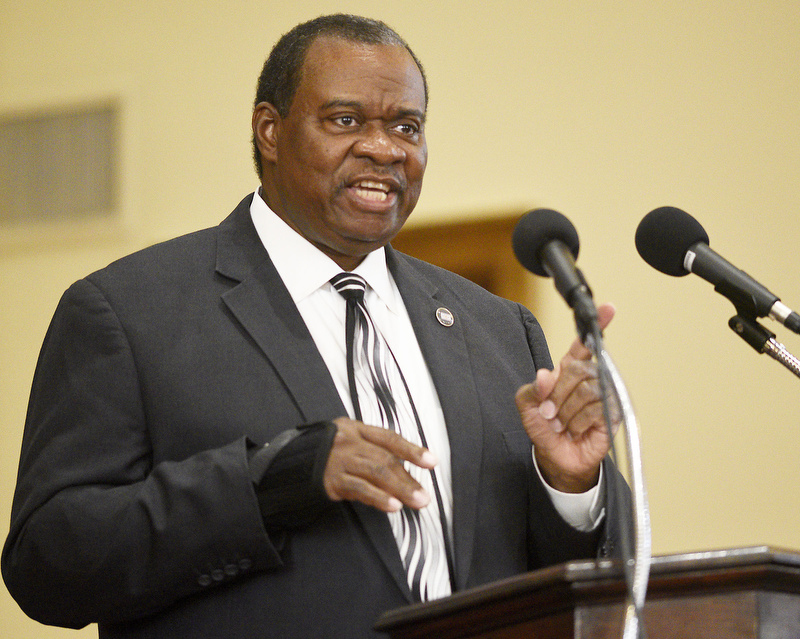NASHVILLE - Gov. Bill Lee on Thursday unveiled new recommendations to strengthen policing policies, boost law enforcement training and improve inter-agency sharing of disciplinary actions about problematic police officers amid civil and racial unrest as well as national calls for systemic police reform.
"Sixty days ago, we promised we would take definitive action for law enforcement reform, addressing policies that impact policing," Lee told reporters on Thursday. "It's important to remember this work ... is a first step in an ongoing process of continuous improvement for law enforcement for Tennessee."
At least one Tennessee lawmaker, Rep. Yusuf Hakeem, D-Chattanooga, said that from what he can tell, Lee's Law Enforcement Reform Partnership guidance falls well short of what he believes is needed. Hakeem saw his own legislative efforts to require more diversity training and other training for law enforcement in areas like de-escalating tensions crash in a House subcommittee back in 2019.
"It's that, recommendations," said Hakeem, a former member of the state Board of Probation and Parole. "It has no force of law or executive order and what in my view is being relied upon is the goodwill of the persons who are in charge to change the way they do things."
Lee's partnership members came from across the state and included top officials of the Tennessee Department of Safety and Homeland Security, Tennessee Highway Patrol, Tennessee Bureau of Investigation, Tennessee Department of Commerce and Insurance, Tennessee Association of Chiefs of Police, Tennessee Sheriffs' Association, state legislators and community leaders.
Among sample guidelines issued by the group are updated use-of-force and duty-to-intervene policies, using measures "consistent" with national standards. A use-of-force policy checklist was created for state and local agencies to review existing policies or serve as a resource for agencies that may have no existing policies.
"This collaborative, transparent initiative ensures all agencies in Tennessee will have addressed the most critical aspects of the proper and lawful application of force and the importance of protective intervention to meet the expectations of the public we serve and are aligned with pending federal guidelines," said TBI Director David Rausch, a former Knoxville police chief.
Almost 90% of Tennessee law enforcement agencies have reviewed their policies and completed the online checklist, and the Tennessee Association of Chiefs of Police and Tennessee Sheriffs' Association will continue to support agencies in reviewing their policies, officials said.
OFFICER TRAINING
The Tennessee Law Enforcement Training Academy, which is under the state Department of Commerce and Insurance's direction, will now require enhanced curriculum and annual in-service training including specific training topics for law enforcement officials across the state.
"Tennessee is committed to having the best law enforcement officers in the nation," said Commerce and Insurance Commissioner Hodgen Mainda. "Through these expanded and enhanced training updates, Tennessee law enforcement officers will continue to receive the best training and standards as we respond to the evolving needs of law enforcement and our communities."
The new training standards for certification include:
* Increasing minimum training hours from 400 to 488 hours.
* Updating curricula to require a minimum of 16 course hours designed for "relevant policing concepts" such as proper use of force and emphasizing positive community and officer interactions.
* Annual in-service training updates, including a total of ten hours dedicated to de-escalation techniques and duty to intervene, officer wellness, public assembly and community interaction and designated community immersion.
INFORMATION SHARING
The state's Peace Officers Standards & Training Commission plans to boost accessibility to state and local departments to the National Decertification Index. The NDI is a national registry that tracks officers who have lost licenses or certificates due to misconduct.
That will "improve information sharing between our law enforcement agencies, strengthen accountability and ensure bad actors are handled appropriately," said Safety & Homeland Security Commissioner Jeff Long.
The state's Notice of Separation form will be expanded to require a more comprehensive and detailed explanation for reasons of departure including disciplinary actions and procedures. It is to be in use by all law enforcement agencies as of Oct. 1.
The governor also wants to use $300,000 of federal coronavirus relief money to help cover the cost of 90 additional police cadet scholarships for smaller departments to train personnel up to standards.
"I think what we want to see is a serious, committed, ongoing effort to make sure that law enforcement responds in a way so we don't have experiences and incidents that have occurred across the country," Lee said. "De-escalation, interaction with public assembly, those are the things we want to see done well. That's what we want the outcome to be."
Prior to the eruption of the coronavirus and civil unrest and police shootings of Black Americans in some areas of the U.S., Lee began 2019 with hopes of pushing through a modest criminal justice reform. That was eventually abandoned.
When Lee's fellow Republicans reconvened in a special legislative session in August, the GOP majority pushed through several measures including one targeting mostly peaceful protests outside the state Capitol where demonstrators had been encamped for some two months protesting Confederate figures still honored at the Capitol as well other issues.
Among other things, the bill made camping on state property without permission a felony punishable by up to six years in prison. Lee signed it into law.
Hakeem, who is Black, said that what is needed is "cultural, structural change" in law enforcement. Some "entrenched" law enforcement departments and agencies "are willing to put on paper what this document says," Hakeem said. "But the actual implementation in my view is another thing. There are no ... incentives or disincentives put forth in this document.
"Who's going to hold your feet to the fire?" Hakeem asked.
Contact Andy Sher at asher@timesfreepress.com or 615-255-0550. Follow on Twitter @AndySher1.

